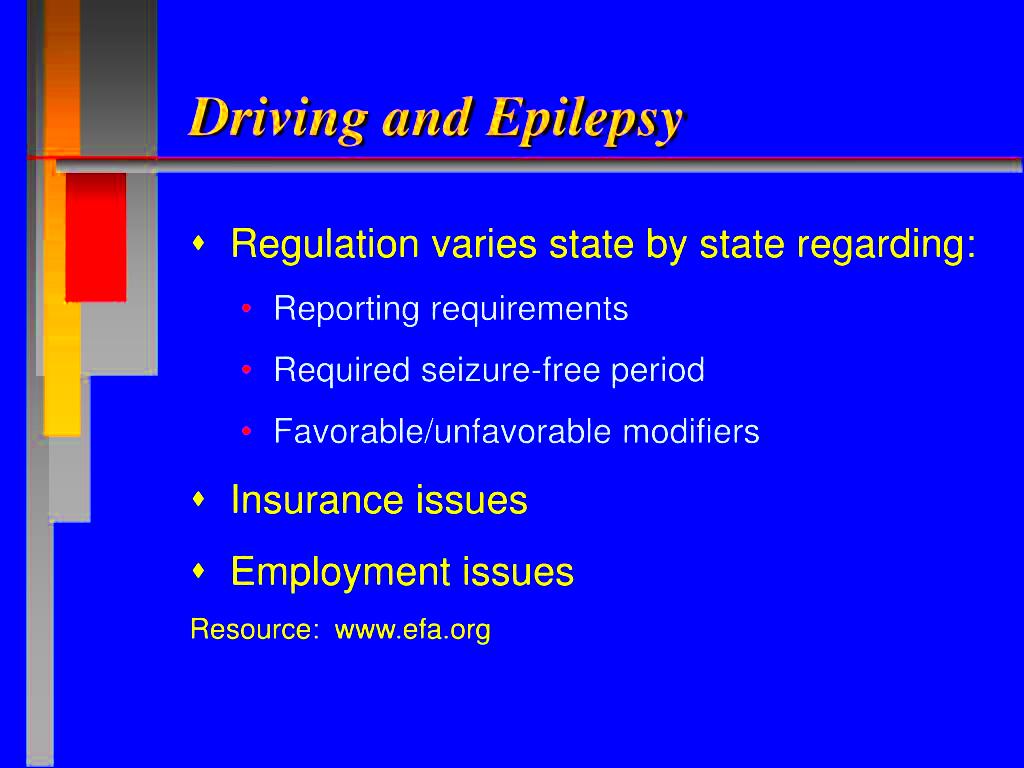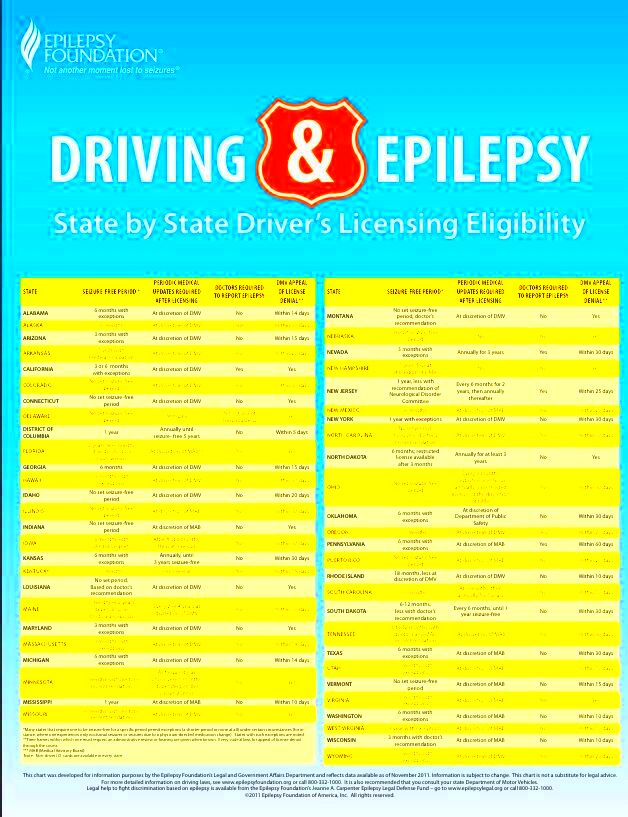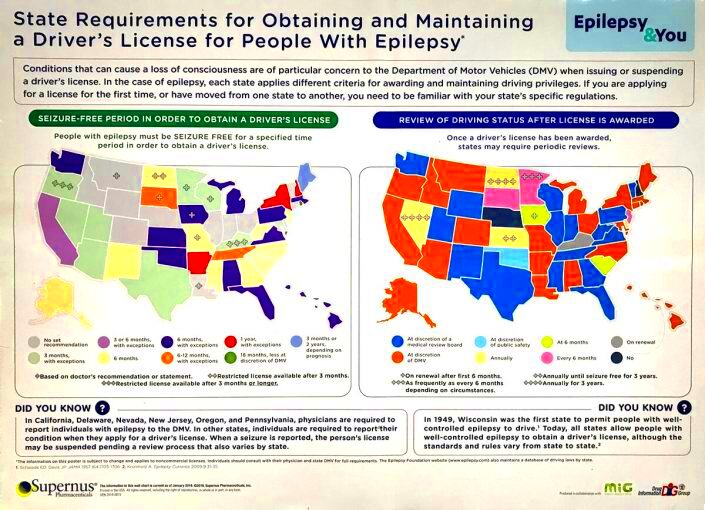Florida Epilepsy Driving Laws Explained
Epilepsy is a neurological disorder that affects millions of people worldwide. It causes recurrent seizures, which can vary in intensity and duration. Understanding how epilepsy affects driving is crucial for both individuals living with the condition and their loved ones.
Driving can be a significant concern for those with epilepsy. Seizures can impair motor skills, reaction times, and awareness, making driving potentially dangerous. For many, losing the ability to drive can impact their independence and daily life.
Here are some key points about epilepsy and driving:
- Types of Seizures: Some seizures may cause a brief loss of awareness, while others might lead to convulsions.
- Triggers: Stress, lack of sleep, and flashing lights can trigger seizures, affecting driving safety.
- Legal Implications: Understanding local laws is essential to ensure compliance and safety.
Overview of Florida Driving Laws for Epilepsy

Florida has specific laws regarding driving with epilepsy to ensure the safety of all road users. The law requires drivers with epilepsy to be responsible for their medical conditions and take necessary precautions.
Here’s a quick look at the relevant laws:
- Reporting Requirement: Drivers with epilepsy must report their condition to the Florida Department of Highway Safety and Motor Vehicles.
- Medical Clearance: A medical professional may need to evaluate the individual’s ability to drive safely.
- Seizure-Free Requirement: In some cases, drivers may need to be seizure-free for a specific period before resuming driving.
Requirements for Drivers with Epilepsy in Florida

In Florida, individuals with epilepsy must meet certain requirements to obtain and maintain their driver’s licenses. These requirements help ensure that drivers can operate a vehicle safely.
Here are the main requirements:
| Requirement | Description |
|---|---|
| Medical Evaluation | Drivers must provide documentation from a physician stating they are fit to drive. |
| Seizure History | A history of seizures may require additional assessments or restrictions. |
| Follow-up Reports | Regular follow-ups with a healthcare provider may be needed to maintain driving privileges. |
| Time Frame for Seizure-Free Status | Individuals might need to be seizure-free for 6 to 12 months, depending on the severity of their condition. |
Being informed about these requirements helps individuals with epilepsy navigate their driving privileges and responsibilities effectively.
Medical Evaluation and Reporting Obligations
For individuals with epilepsy in Florida, undergoing a medical evaluation is a key part of ensuring safe driving. This evaluation not only assesses the individual’s seizure control but also determines their overall fitness to drive. It’s important to keep both the medical community and the Department of Highway Safety informed about your condition.
Here are the main components of the medical evaluation and reporting obligations:
- Initial Evaluation: A healthcare provider will evaluate your medical history, seizure activity, and medication regimen.
- Documentation: You’ll need to provide official documentation that confirms your ability to drive safely. This report is essential for the licensing process.
- Regular Check-ups: After the initial evaluation, ongoing assessments may be required to monitor your condition and ensure you remain fit to drive.
- Reporting Obligations: If your seizure activity changes or you experience new symptoms, it’s crucial to report this to the Florida Department of Highway Safety immediately.
Staying proactive about your health and adhering to these obligations can help you maintain your driving privileges and keep the roads safer for everyone.
Consequences of Violating Driving Laws
Not adhering to Florida’s driving laws regarding epilepsy can lead to serious consequences. Whether you fail to report your condition or drive despite medical advice, the implications can be significant.
Here are some potential consequences you may face:
- Fines and Penalties: Failing to report your condition may result in fines or legal action.
- License Suspension: If you drive without proper medical clearance, your license can be suspended or revoked.
- Legal Liability: If you are involved in an accident due to a seizure, you could face civil lawsuits or criminal charges.
- Increased Insurance Rates: Violations can also lead to higher premiums or difficulty obtaining car insurance.
Understanding these consequences emphasizes the importance of being responsible and compliant with the laws. It’s always better to be safe than sorry, both for yourself and others on the road.
Resources for Drivers with Epilepsy
For drivers with epilepsy, accessing the right resources can make a world of difference. These resources provide valuable information and support to help navigate the challenges of driving with a medical condition.
Here are some useful resources you might consider:
| Resource | Description |
|---|---|
| National Epilepsy Foundation | A comprehensive source for information on epilepsy, including driving laws and safety tips. |
| Florida Department of Highway Safety | Offers guidelines and requirements for drivers with medical conditions. |
| Support Groups | Connecting with local or online support groups can provide emotional support and practical advice. |
| Healthcare Providers | Your doctor can provide ongoing support and necessary evaluations to ensure your safety. |
Utilizing these resources can help you stay informed and empowered as you manage your epilepsy while maintaining your driving privileges.
Legal Rights of Individuals with Epilepsy
Individuals with epilepsy have legal rights that protect them from discrimination and ensure their ability to participate fully in society, including driving. Understanding these rights is essential for those living with epilepsy, as well as for their families and advocates. These rights help create an environment where individuals can pursue their passions and maintain their independence.
Here are some key legal rights for individuals with epilepsy:
- Americans with Disabilities Act (ADA): This federal law protects individuals with disabilities, including epilepsy, from discrimination in various areas, including employment and public services.
- Right to Reasonable Accommodations: Employers and educational institutions must provide reasonable accommodations to help individuals with epilepsy succeed. This might include modified work schedules or additional breaks.
- Driving Rights: As long as individuals meet the medical requirements, they have the right to obtain and keep a driver’s license, regardless of their epilepsy status.
- Privacy Rights: Individuals are not obligated to disclose their epilepsy to employers or others unless it directly affects their job performance or safety.
Being aware of these rights is crucial for individuals with epilepsy. If you believe your rights are being violated, consider reaching out to legal advocacy groups for support and guidance.
Conclusion
Understanding the laws and resources surrounding epilepsy and driving in Florida is vital for individuals affected by this condition. Awareness of the medical evaluation process, reporting obligations, and legal rights can help ensure safer roads for everyone. Furthermore, knowing the consequences of violating these laws emphasizes the importance of responsible driving and adhering to medical advice.
For individuals with epilepsy, utilizing available resources can provide support and guidance throughout their journey. By staying informed and proactive, those with epilepsy can maintain their independence while ensuring their safety and the safety of others on the road.
FAQ
Q: Can I drive if I have epilepsy?
A: Yes, you can drive if you meet the medical requirements and are seizure-free for a specified period, as determined by your healthcare provider.
Q: How do I report my epilepsy to the Florida Department of Highway Safety?
A: You can report your condition by submitting a medical evaluation form completed by your physician to the Department of Highway Safety.
Q: What should I do if I have a seizure while driving?
A: If you have a seizure while driving, pull over safely to the side of the road if possible and turn on your hazard lights. After the seizure, seek medical assistance if necessary and report the incident as required by law.
Q: Are there any support groups for people with epilepsy?
A: Yes, there are numerous support groups available both locally and online where individuals with epilepsy can share experiences and receive support.


